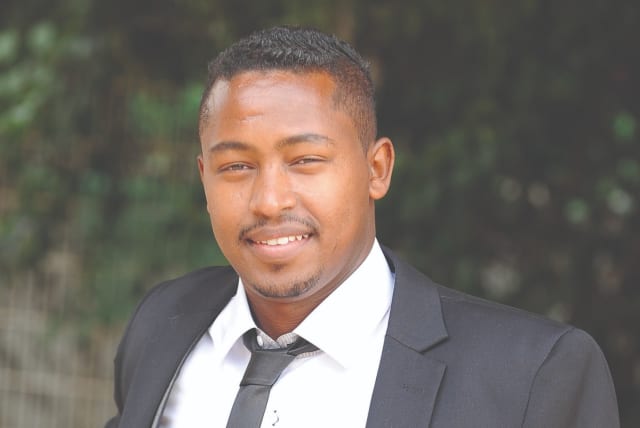Israel airlifted him from Ethiopia. Now he's a hi-tech entrepreneur

Solomon Geveye immigrated to Israel and became a successful hi-tech entrepreneur. Now he's trying to help other Ethiopian-Israelis break into hi-tech.

Solomon Geveye, 38, was born in the mountainous Gondar region of Ethiopia. His family was part of the historic Operation Solomon in 1991, in which more than 14,300 Ethiopian Jews were clandestinely airlifted to Israel over a 36-hour period. Today, Geveye is establishing the Haile Venture Capital Fund, the first fund of its kind to support first-generation Ethiopian-Israeli tech entrepreneurs.
“I was six years old when my parents made aliyah with five children. My other four siblings were already in Israel,” says Geveye. “I remember how excited we all were as we began our new life in Ashdod. It was a 2,000-year-old dream come true.”
For Geveye, living in Israel was a new adventure. But for his parents, it was very difficult to go from an agrarian lifestyle to a Westernized country. “My parents were such role models for me,” he says. “They had so little and worked really hard, but they accomplished so much in integrating and raising successful children.”
Geveye quickly learned Hebrew. He was so bright that he skipped first grade. Although he was an outstanding soccer player, at the age of 13 he chose school over sports. “I wanted to get good grades and do meaningful army service,” he explains. “Even at that young age, I knew that education was key to getting ahead.”
When Geveye heard about the prestigious Academic Reserves Program from an Atidim organization representative who visited his high school, he knew that this program was for him. He got his BA degree in economics from Ariel University with Atidim’s support and then committed to six years in the professional army.
“I served as an economist in the IDF for seven and a half years,” says Geveye. “I was part of a team that planned and managed $100 million budgets. It was an incredible amount of responsibility at such a young age, but I learned so much. It was my springboard to civilian life and gave me invaluable skills for my future.”
During that period, he completed his MBA degree. Geveye retired from the IDF as a captain.
In early 2015, Geveye relocated to Los Angeles with his wife, Michelle Ofir, who was accepted to a prestigious MBA program. He worked as a financial professional during this time and was CEO of a boutique security company that provided security services for the Jewish community. After five years, Geveye’s mother became ill, and they returned to Israel.
“It was very important for me to take care of my mother,” explains Geveye. “She did so much for all of us. I am grateful that I was here, and not far away, when she passed.”
With his business experience, Geveye jumped into the Israeli hi-tech scene. In 2019, he founded his own consulting company, IEA (Israel, Ethiopia, America), which brought emerging Israeli technologies and investments to more advanced African countries such as Nigeria and Ethiopia. He also facilitated projects between Israeli and American companies and African organizations.
Realizing his own dream as an entrepreneur, in 2021 he became a partner and the chief business development officer for MetekuAI, a seed stage start-up. “The company combines advanced artificial intelligence with human expertise to address the problem of fake news, disinformation, and organic content distribution on social media,” says Geveye.
Helping Ethiopian-Israelis advance in hi-tech
WHILE PURSUING his own advancement in hi-tech, Geveye realized that Ethiopian-Israelis are severely under-represented in this sector. He decided to do something about it.
“First, I researched to see if there was a market for a VC fund that promotes Ethiopian-Israeli entrepreneurs,” says Geveye. “I saw that Ethiopians have the talent, with a sharp rise in higher education over the past five years, but they lack the opportunity, network, and funding sources needed.
“There are no accelerators or VC funds targeted for Ethiopian-Israelis, like there are for women and Arab-Israelis,” he says. “Nor is there even one nationally successful start-up founded by an Ethiopian-Israeli.”
Geveye launched the Haile Fund (haile means “within my power” in Amharic) in July 2023, with an experienced advisory team and professional partners from across the hi-tech ecosystem. He aims to raise $10 million to support pre-seed and seed-stage companies with at least one Ethiopian-Israeli founder.
“With the outbreak of the war in October, and the ongoing economic impact, there has been less focus on advancing diversity and inclusivity in hi-tech,” says Geveye. “However, looking toward 2024, there has been a lot of attention on the need to strengthen Israel’s tech sector and support new start-ups. This is the engine that drives Israel’s economy, and my goal is for Ethiopian-Israelis to be part of this.”
Geveye currently has 13 early-stage companies in the pipeline that need pre-seed investment.
“Studies show that immigrants who have experienced challenges in acclimatization have valuable skills and traits that can make them successful entrepreneurs,” he says. “This includes adaptability, resilience, and a high tolerance for risk.”
Additionally, the fund, with the support of the Israel Innovation Authority, is establishing an entrepreneurship and acceleration program called Haile Scale, which will provide learning and support services to the fund’s entrepreneurs, operated by the Reichman Entrepreneurship School.
“I believe in hard work and in pursuing my dreams,” says Geveye, who alongside his work is a volunteer board member for several nonprofits. “I see myself as a highly driven person with a great passion for entrepreneurship, education, Israel advocacy, and social justice, and I strive to improve these fields in any way I can.”
Geveye and his wife plan to pass these values on to their three-year-old daughter and their newborn twins. ■
SOLOMON GEVEYE, 38 FROM ETHIOPIA’S GONDAR REGION TO ASHDOD, 1991
Jerusalem Post Store
`; document.getElementById("linkPremium").innerHTML = cont; var divWithLink = document.getElementById("premium-link"); if (divWithLink !== null && divWithLink !== 'undefined') { divWithLink.style.border = "solid 1px #cb0f3e"; divWithLink.style.textAlign = "center"; divWithLink.style.marginBottom = "15px"; divWithLink.style.marginTop = "15px"; divWithLink.style.width = "100%"; divWithLink.style.backgroundColor = "#122952"; divWithLink.style.color = "#ffffff"; divWithLink.style.lineHeight = "1.5"; } } (function (v, i) { });

